Future Trends in Artificial Intelligence Technology: Discover the latest advancements and predictions shaping AI’s future. Explore how AI is revolutionizing industries, enhancing innovation, and transforming our world.
Artificial Intelligence (AI) technology is rapidly evolving, transforming industries and reshaping the future. As we stand on the brink of a new era, understanding the upcoming trends in AI is crucial for businesses, researchers, and enthusiasts alike.
This blog post delves into the most significant future trends in AI technology, offering insights into how these advancements will impact various sectors and our daily lives.
In this article, you will discover the latest developments in machine learning, the rise of generative AI, and the transformative potential of AI in healthcare, automation, and environmental sustainability. By the end of this post, you’ll have a comprehensive understanding of where AI is headed and how it can be leveraged to drive innovation and efficiency.
Advancements in Machine Learning and Deep Learning
Machine learning (ML) and deep learning (DL) are leading the way in AI. They are changing many industries. Let’s look at some key developments in these areas.
Improve Algorithms and Models
New algorithms and models are making machines smarter. Techniques like reinforcement learning and generative adversarial networks (GANs) are changing how machines learn. These advancements help make better predictions and decisions.
Increased Computational Power
Thanks to powerful GPUs and TPUs, machines can do more. This means they can train on bigger and more complex models. This is leading to big improvements in areas like natural language processing and computer vision.
Applications in Various Industries
ML and DL are being used in many fields. In healthcare, AI is helping with diagnoses and personalized medicine. In finance, it’s improving fraud detection. The automotive industry is using it for self-driving cars and safety systems.
Ethical Considerations and Challenges
As AI gets smarter, we must think about ethics. Issues like bias in AI models and data privacy are big challenges. We need to make sure AI is fair and transparent.
Businesses and researchers can use ML and DL to innovate and improve efficiency.
Generative AI
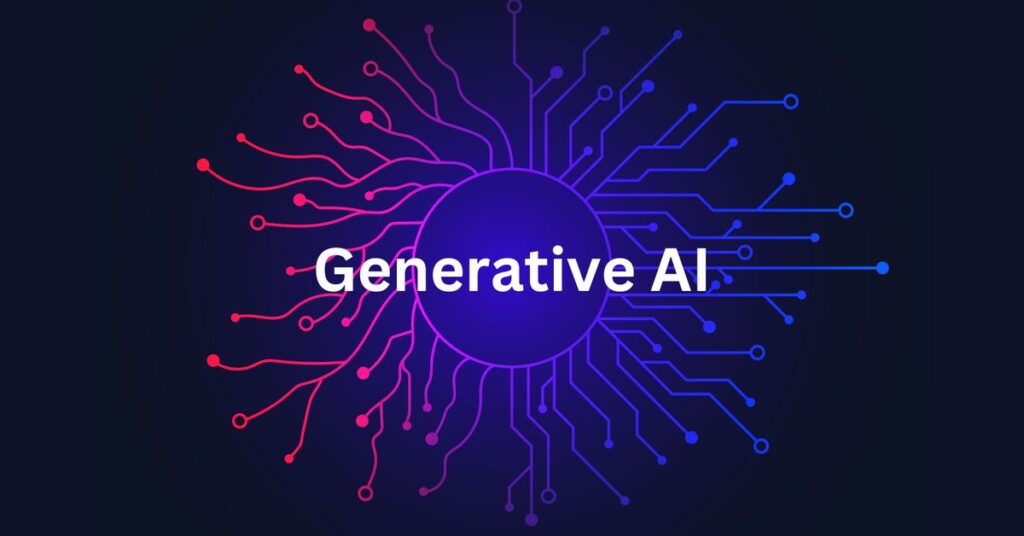
Generative AI is changing how we create and interact with content. It’s offering new possibilities in many areas. Let’s explore some key aspects of generative AI.
Development of Multimodal AI Models
Generative AI has gone beyond text to include models for text, images, audio, and video. Models like OpenAI’s DALL-E and Google’s Imagen can create realistic content. This opens up new opportunities for creative fields, marketing, and entertainment.
Use Cases in Content Creation, Design, and Entertainment
Generative AI is being used in content creation and design. It can write articles, design graphics, compose music, and create virtual environments. In entertainment, it’s helping with video game characters, scripts, and special effects.
Ethical Considerations and Challenges
Generative AI brings many benefits but also raises ethical concerns. Issues like copyright infringement and deepfakes are challenges. It’s important to use generative AI responsibly and ethically to maintain trust.
Impact on Various Industries
Generative AI is changing many industries by automating hard tasks and sparking new creativity. It helps in drug discovery and making treatment plans for each patient in healthcare. In finance, it creates financial reports and predictive analytics. It also makes learning materials for schools and automated customer service responses.
By using generative AI, businesses and people can find new ways to innovate and work more efficiently. This leads to progress in many areas.
AI in Healthcare
Artificial Intelligence (AI) is changing healthcare by making diagnoses better, personalizing treatments, and improving patient care. Here are some key advancements and uses of AI in healthcare:
Personalized Medicine and AI-Driven Diagnostics
AI is changing how we diagnose diseases by making it more accurate and quick. Machine learning can look at medical images to find problems. This is especially good for catching cancer early, when it’s easier to treat.
AI also helps make treatment plans that fit each patient’s needs. It looks at their genes, lifestyle, and medical history. This approach makes treatments more effective and reduces side effects.
AI in Drug Discovery and Development
Finding and developing new drugs is slow and expensive. AI is making this process faster by predicting how compounds work in the body. This helps find potential drugs quicker.
AI also looks through lots of medical data to find new ways to treat diseases. This speeds up the creation of new treatments, helping patients all over the world.
Impact on Patient Care and Healthcare Systems
AI is making patient care better by automating simple tasks and making healthcare systems more efficient. AI chatbots can handle things like scheduling and answering questions, letting doctors focus on harder tasks.
In hospitals, AI watches over patients and alerts doctors to any changes that need attention. This helps prevent problems and improves care.
Ethical Considerations and Challenges
AI brings many benefits but also raises important ethical questions. Issues like data privacy, bias in algorithms, and the clarity of AI decisions are big challenges.
It’s crucial to make sure AI systems are fair, open, and accountable. We also need rules to guide how AI is used in healthcare, so it’s used responsibly.
AI is changing healthcare for the better, helping care for patients, speeding up medical research, and making healthcare systems more efficient. The future of healthcare is linked with AI, promising a new era of medical innovation and better patient care.
AI and Automation
Artificial Intelligence (AI) and automation are changing industries by making processes smoother, improving productivity, and driving innovation. Here are some key aspects of AI and automation:
Automation of Routine Tasks
AI and automation are taking over simple tasks in many fields. In manufacturing, robots do assembly line work, making things more efficient and reducing mistakes. In service industries, AI chatbots handle customer questions and tasks, letting people focus on more complex work.
Impact on the Workforce and Job Market
The growth of AI and automation is changing the job market. While some jobs might disappear, new ones will appear in AI, data analysis, and robotics. People will need to learn new skills and keep learning to stay relevant in a changing job world.
Companies and governments must work together to help those affected by automation. They need to provide training and support for workers.
Balancing Efficiency with Ethical Concerns
AI and automation are changing how we work. But, we must think about job loss, data privacy, and how AI makes decisions. It’s key to make AI fair and open to keep trust and benefits.
Companies should focus on fairness, being accountable, and being clear about AI use.
Applications in Various Sectors
AI and automation are changing many fields. In healthcare, AI helps with tasks like scheduling and billing. This lets doctors focus on patients.
In logistics, AI improves supply chain management. This cuts costs and speeds up delivery. The finance world uses AI for fraud detection and trading, making operations faster and more accurate.
These technologies boost productivity and innovation. They open new opportunities. The future of work will be more efficient and dynamic.
AI in Climate Change and Environmental Sustainability
AI is crucial for fighting climate change and protecting the environment. Here’s how AI is making a difference:
AI for Climate Modeling and Prediction
AI helps us better understand and predict climate patterns. Machine learning analyzes climate data to forecast extreme weather. This helps communities prepare and save lives and money.
Sustainable Agriculture and Resource Management
AI is changing agriculture for the better. It helps farmers use resources wisely and grow more crops. AI also supports sustainable forestry and fisheries by monitoring ecosystems.
Reducing Carbon Footprint
AI is cutting carbon emissions in many areas. In transport, AI finds the best routes, saving fuel and emissions. Smart grids use AI to manage energy better, using more green energy and less fossil fuels. AI also designs energy-saving buildings and manages waste.
AI in Environmental Monitoring
AI systems are improving how we monitor and protect the environment. For example, AI tracks deforestation and wildlife from space. This helps in making better conservation plans and policies.
Ethical Considerations and Challenges
AI is a big help for the environment, but it has challenges. AI systems use a lot of energy, especially when training. We’re working on making AI more energy-efficient and using green energy for data centers.
It’s also important to make sure AI is fair and open. This keeps public trust and support for climate solutions.
AI in Cybersecurity
AI is changing cybersecurity by making threat detection and response better. Here are some key ways AI is helping:
AI for Threat Detection and Prevention
AI is getting better at finding and stopping cyber threats. Machine learning looks for patterns in data to spot attacks. This means quicker responses and less damage.
AI is especially good at catching complex threats like zero-day exploits and APTs.
Enhancing Data Privacy and Protection
AI is also key in keeping data safe and private. AI algorithms watch data access and find unusual activities that might be a breach. AI helps encrypt data and manage access better.
This automation makes sure data stays secure and follows privacy rules.
Automating Incident Response
AI is changing how we handle cyber attacks by automating tasks. AI systems quickly figure out the attack, its impact, and how to counter it. This makes responding to attacks faster, reducing damage and speeding up recovery.
AI also helps in forensic analysis. It identifies the source and method of an attack. This helps in understanding and preventing future attacks.
Predictive Capabilities
AI’s predictive power is a big plus in cybersecurity. It looks at past data and trends to predict future attacks. This lets organizations strengthen their defenses before an attack happens.
AI can also help in deciding where to focus security efforts. It prioritizes threats based on likelihood. This makes security efforts more effective.
Ethical Considerations and Challenges
AI in cybersecurity has its benefits but also raises challenges. It’s important to be transparent and accountable with AI. There are worries about AI being biased or making mistakes that could harm a lot.
As AI gets more involved in security, so might cybercriminals. They might use AI to create more complex attacks. It’s key to make sure AI systems are secure and can handle these threats.
AI and Human-Computer Interaction
Artificial Intelligence (AI) is changing how we interact with computers. It’s making interfaces more intuitive, responsive, and personalized. Here are some key advancements and applications of AI in HCI:
Development of Intuitive Interfaces
AI is making computer interfaces more user-friendly. Natural language processing (NLP) lets us talk to devices in everyday language. Voice assistants like Google Assistant and Amazon Alexa show how AI is making interactions easier with voice commands.
AI in Virtual and Augmented Reality
AI is key in improving virtual reality (VR) and augmented reality (AR). AI algorithms make virtual environments more realistic and AR overlays more accurate. These advancements are used in gaming, education, and healthcare to create immersive experiences.
Enhancing User Experience through Personalization
AI is changing user experience by offering personalized content. Machine learning algorithms tailor content based on user behavior and preferences. This makes content more relevant and engaging for users.
Predictive and Intelligent User Interfaces
AI is creating interfaces that can predict what users need. For example, AI can guess the next word you’ll type. This makes typing faster and more efficient. AI is also used in email clients to suggest responses based on the conversation.
Ethical Considerations and Challenges
As AI becomes more part of our interactions, we must think about ethics. Issues like data privacy, bias in algorithms, and the transparency of AI-driven interactions are big challenges.
It’s important to design AI systems that are fair and accountable. This ensures user trust. Developers must also think about how AI affects user autonomy and decision-making.
Ethical and Regulatory Considerations
As AI advances, ethical and regulatory issues become more pressing. It’s vital to address these to ensure AI is developed and used responsibly. Here are some key aspects to consider:
Addressing Bias and Fairness in AI
AI systems can reflect biases in the data they’re trained on. To ensure fairness, we must identify and reduce these biases. Techniques like bias detection algorithms and diverse training datasets are crucial. Ongoing research and collaboration are needed to find effective solutions.
Data Privacy and Security
AI uses a lot of personal data, which raises privacy and security concerns. AI needs to follow data protection laws like GDPR. Using strong encryption and anonymization helps keep data safe.
Being open about how data is used and getting consent from users is key. This makes sure AI is used ethically.
Transparency and Accountability
Being clear about how AI works is crucial for trust and accountability. Techniques like explainable AI (XAI) help show how AI makes decisions. It’s also important to know who is responsible for AI’s actions.
Organizations need to have clear rules for AI use. This includes defining roles and responsibilities for AI development and use.
Regulatory Frameworks and Policies
Governments and regulatory bodies are important for AI ethics. They need to create rules that balance innovation with responsibility. Working together globally helps ensure fairness in AI use worldwide.
Ensuring Ethical AI Development
Creating ethical AI needs a team effort from tech experts, ethicists, and more. Companies should follow ethical guidelines, like those from the European Commission. Regular checks and assessments help spot and fix ethical issues early.
Conclusion
Artificial Intelligence (AI) is rapidly evolving, bringing transformative changes across various sectors. From advancements in machine learning and deep learning to the rise of generative AI, the potential applications of AI are vast and varied.
In healthcare, AI is revolutionizing diagnostics and personalized medicine, while in cybersecurity, it enhances threat detection and data protection. AI is also playing a crucial role in addressing climate change and promoting environmental sustainability.
As AI continues to integrate into our daily lives, it is essential to address the ethical and regulatory considerations that come with it. Ensuring fairness, transparency, and accountability in AI systems is crucial for building public trust and fostering responsible innovation.
By staying informed about the latest trends and developments in AI, businesses, researchers, and individuals can harness its power to drive progress and create a better future.
The future of AI is promising, with endless possibilities for innovation and improvement. As we navigate this rapidly changing landscape, it is important to embrace the opportunities AI presents while remaining mindful of the challenges. Together, we can leverage AI to enhance our lives, solve complex problems, and build a more sustainable and equitable world.
FAQ: Future Trends in Artificial Intelligence Technology
What are the key advancements in AI expected in the next decade?
Key advancements include enhanced machine learning algorithms, increased computational power, and the rise of generative AI, which will revolutionize content creation and automation across various industries.
How will AI impact the healthcare industry?
AI will improve diagnostics, personalize treatment plans, and accelerate drug discovery. It will also enhance patient care through AI-driven monitoring systems and virtual assistants.
What role will AI play in addressing climate change?
AI will aid in climate modeling, optimize resource use in agriculture, and reduce carbon footprints through smart grids and energy-efficient designs. It will also enhance environmental monitoring and conservation efforts.
How will AI transform cybersecurity?
AI will enhance threat detection and prevention, automate incident response, and improve data privacy. Predictive AI will help anticipate and mitigate future cyber threats.
What ethical considerations are associated with AI development?
Ethical considerations include addressing bias and fairness, ensuring data privacy, and maintaining transparency and accountability in AI systems. Regulatory frameworks are essential to guide responsible AI development. AI development?
Ethical considerations include addressing bias and fairness, ensuring data privacy, and maintaining transparency and accountability in AI systems. Regulatory frameworks are essential to guide responsible AI development.

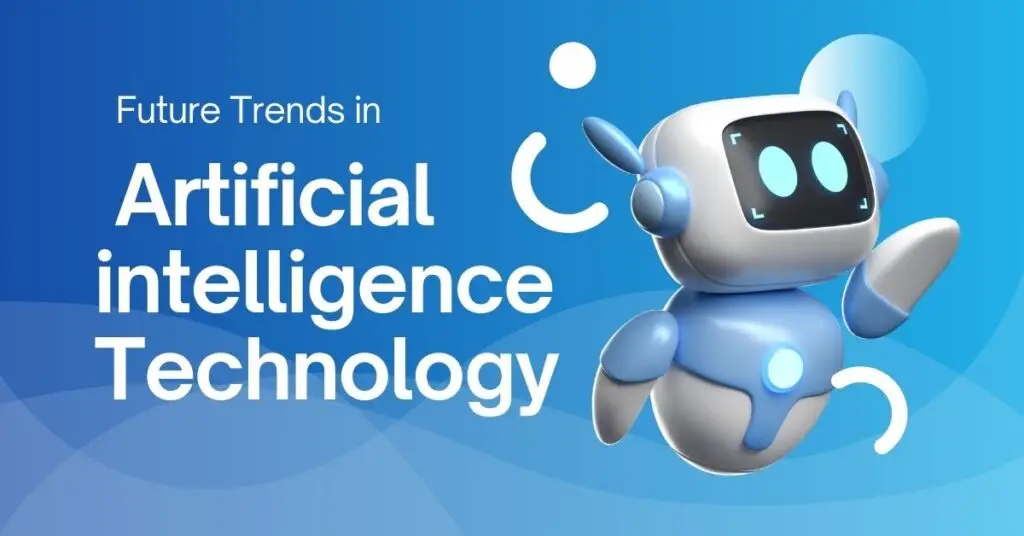
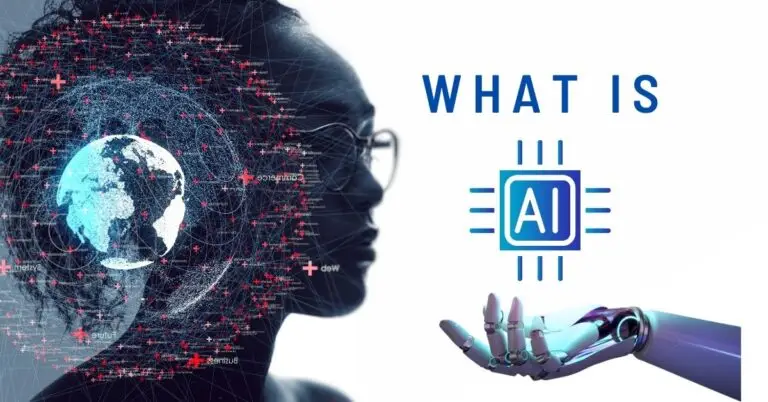
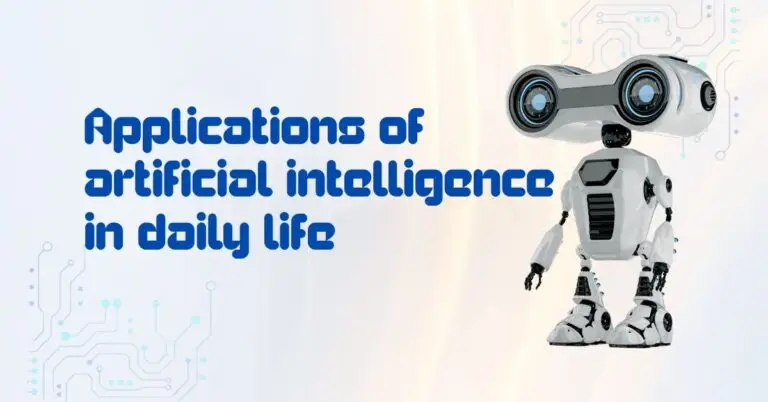
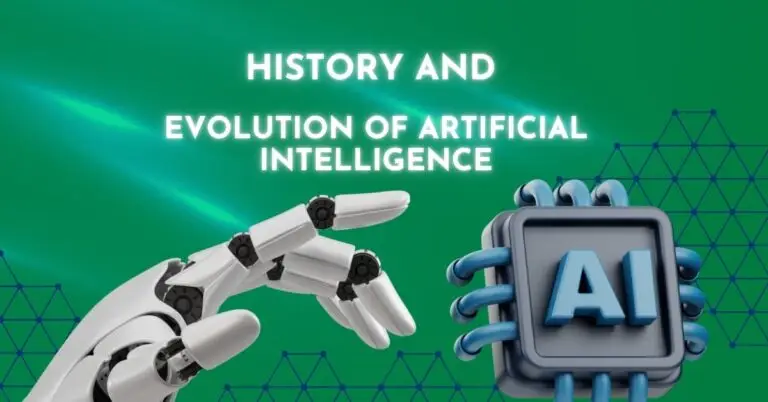

3 thoughts on “Future Trends in Artificial intelligence Technology”